На месте одного из отелей в Гермассойе возведут многоэтажное офисное здание Global Tower. Бюджет проекта оценивается в 4 млн евро.
Застройщиком выступает компания Radikalino Holdings Ltd. Здание будет состоять из подземного уровня, семи надземных уровней и технического этажа. Высота составит 29 метров от уровня проезжей части.
Чтобы построить офисное здание, придется снести отель Estella, расположенный на участке. Отель не действует в течение последних нескольких лет. Ожидается, что снос и строительные работы вместе займут около двух лет.
Исследование последствий строительства для окружающей среды идентифицировало пять видов флоры, включая декоративные кустарники, из которых только один вид (финиковая пальма) подпадает под действие Закона о лесах и требует разрешения на вырубку. Также были идентифицированы три вида птиц, один из которых (сизый голубь) защищен европейской директивой 2009/147. Участок расположен на пути следования перелетных птиц.
Кроме того, эта часть Гермассойи уже плотно застроена, в основном жилыми и туристическими объектами, поэтому создание нового офисного комплекса скажется на дорожном движении и создаст нагрузку на коммуникации.
Данные экспертизы переданы в Департамент защиты окружающей среды на одобрение. Только после этого можно будет приступить к сносу старой гостиницы.
Читайте также:
Где в Лимассоле «точки притяжения» офисов?
Новый «зеленый» отель в Лимассоле
По данным Статистической службы индекс цен на жилье за первый квартал 2023 года составил в 110,14 единиц.
По сравнению с четвертым кварталом 2022 года индекс увеличился на 2%, а по сравнению с первым кварталом 2022 года — на 5,9%.
Индекс цен на жилье — это ежеквартальный индекс, который измеряет изменение средней цены единицы жилья. Он охватывает все типы жилых единиц, как новостройки, так и вторичный рынок. Стоимость земли включена в цену. Источником данных для расчета индекса выступает Департамент земельного кадастра. Данные охватывают все районы, находящиеся под контролем правительства Республики Кипр. За 100 единиц приняты показатели 2015 года.
Цены на недвижимость растут и по данным Центробанка. Индекс цен на жилье ЦБ Кипра зафиксировал как квартальный, так и годовой рост в четвертом квартале 2022 года. Квартальный рост индекса составил 1,6% (в предыдущем квартале — 2,1%). В годовом исчислении в четвертом квартале 2022 года цены на жилье выросли на 6,6% (в третьем квартале 2022 года — 6,3%).
Продолжающийся рост цен в основном обусловлен увеличением затрат на строительство (несколько замедлившимся в последнее время), и растущим спросом на недвижимость.
Читайте также:
33 тысячи домов и квартир на Кипре пустуют
Куда движется рынок недвижимости
А. RUDENKO & CO LLC – юридическая бутик-фирма, предоставляющая клиентам широкий спектр услуг в сферах коммерческого, корпоративного и иммиграционного права. Партнер-основатель фирмы, Алексей Руденко, лицензированный адвокат на Кипре, обладает высокой квалификацией, полученной в одном из лучших университетов Кипра. Степень бакалавра в сфере английского права подкреплена опытом практической работы, а свободное владение греческим, русским и английским языками, помогает найти общий язык со всеми клиентами.
Основные услуги:
• Коммерческие соглашения
• Корпоративное управление
• Номинальные услуги
• Сделки с недвижимостью
• Иммиграционные услуги
• Вопросы интеллектуальной собственности
• Банковское дело и финансы
• Налоговые консультации
Судебная практика
Фирма сотрудничает с ведущими адвокатами на Кипре и за его пределами по судебным разбирательствам, что помогает решать проблемы клиентов любой сложности.
Поддержка бизнеса на Кипре
А. RUDENKO & CO LLC может помочь с юридической поддержкой бизнесов любого калибра: от стартапов до крупных организаций, включая структуризацию, соглашения между партнерами, правовую защиту в досудебных и судебных разбирательствах.
Почему клиенты выбирают A. Rudenko & Co LLC
Индивидуальный подход, забота о клиентах, лояльность – среди основных ценностей̆ учредителя и сотрудников офиса.
Кроме того, преимуществами работы с этой компанией являются:
• Конфиденциальность
• Оперативность
• Предоставление услуг на разных языках
Вне зависимости от выбранных услуг профессиональная команда A. RUDENKO & CO LLC обеспечит оперативность и полную конфиденциальность в отношении любой информации, полученной от клиентов.
A. RUDENKO & CO LLC предоставляет свои услуги на греческом, английском и русском языках. Свободное владение греческим языком способствует более эффективному и быстрому решению вопросов с местными государственными органами.

Rudenko & Co LLC
Email: Этот адрес электронной почты защищён от спам-ботов. У вас должен быть включен JavaScript для просмотра.
Tel: +357 99 983533
Интервью с братьями Давидом и Александром Петросянами, владельцами девелоперской компании CDA Group на Кипре, показывает, что за строительными проектами стоят живые творческие люди. Братья рассказывают о том, как их опыт работы и личная ответственность влияют на создание доверия у покупателей. Они не только вовлечены во все этапы работы, но и уделяют внимание желаниям и предпочтениям клиентов. Стремясь к совершенству, они делают все возможное, чтобы создать комфортные и радостные условия для жизни и работы людей, выбирающих их объекты недвижимости.
– Когда человек вкладывается в строительство на этапе фундамента, крайне важное значение имеет доверие к компании-девелоперу. На основании чего инвесторы могут вам доверять?
Д.: Во-первых, думаю, что очень важный фактор доверия – это то, что владельцы компании непосредственно включены в процесс деятельности. Можно сказать, что мы несем личную ответственность за качество того, что строим.
– Вы вовлечены во все этапы работы – от планирования макета до продажи?
Д.: Вы правы, мы участвуем на всех этих этапах. Больше того, мы обязательно постоянно приезжаем в построенные здания, общаемся с покупателями и собираем полезные идеи для новых проектов.
Например, однажды наши друзья посоветовали нам сделать на парковке одного жилого комплекса специальное место с тележками. Такими, как в супермаркете. Это очень удобно, особенно для женщин, которые, забирая детей из школы, делают покупки и возвращаются домой с тяжелыми пакетами. Они могут воспользоваться тележкой, чтобы поднять вещи к себе в квартиру и потом отправить ее вниз или попросить консьержа это сделать.
А.: Мы прислушиваемся к разным идеям. Начиная от таких простых и включая, например, элементы внешней подсветки здания. На наш взгляд, очень важно собирать информацию об ожиданиях и предпочтениях наших клиентов, о существующих или появляющихся трендах. Совсем недавно при проектировании одного из новых жилых зданий мы общались с покупателями, и многие из них говорили о том, что им хочется, чтобы в их доме была вся инфраструктура: не только внешний бассейн, но и спа-центр с внутренним бассейном, тренажерный зал и т. д. Мы учли это пожелание.
И даже запроектировали для жильцов дома executive floor c бизнес-лаунж и рестораном на 16-м этаже.
Там каждый день будет сервироваться завтрак. Там же можно заказать проведение вечеринки, отпраздновать день рождения или провести банкет. Для этого нужно у консьержа забронировать 16-й этаж на конкретную дату, и мы обеспечим кейтеринг.
Д.: Мы вообще всегда стараемся идти навстречу нашим клиентам. Не так давно одна покупательница, рассматривая наше предложение, попросила перечислить все, что входит в инфраструктуру комплекса (парк, бассейн, детская площадка, площадка для выгула собак, бар, тренажерный зал...). Внимательно выслушала наш рассказ, а потом сказала, что ей еще нужен маникюрный салон. Мы, конечно, были удивлены, но в конце концов добавили салон красоты в самом комплексе.
– Но за все это кто-то должен заплатить?
А.: Это наша задача. Мы должны обеспечить все эти преимущества за разумную стоимость квадратного метра площади, которая будет использоваться для инфраструктуры комплекса. Более того, коль скоро мы говорим о премиальном проекте Westminster Residences, здесь стоимость за квадратный метр крытой площади не превышает стоимости квадратного метра в самых обычных проектах на несколько квартир!
– Какова стоимость квадратного метра?
А.: В этом комплексе, с учетом скидок, стоимость начинается с 6 тысяч евро за квадратный метр крытой площади. Для такого уровня эта цена очень небольшая.
– Говоря о надежности компании, хочу упомянуть о том, что вы и ваши семьи живете на Кипре и не планируете никуда уезжать с острова. Поэтому вы будете делать все, чтобы с гордостью смотреть в глаза своим клиентам.
Д.: Абсолютно верно. Кроме того, у CDA Group нет ни одного кредита и ни одного стороннего инвестора. Наш бизнес принадлежит семье и управляется ею, и мы серьезно относимся к его репутации.
Вы, наверное, знаете, что, когда у компании есть сторонние инвесторы, часто могут возникать разногласия в видении проекта, его бюджета, используемых материалов и других вопросов. И это может привести к замораживанию строительства.
– Получается, что вы строите только на свои средства?
А.: Да. При работе над проектом мы используем только свои средства. Мы не зависим от того, какое количество квартир или офисов будет куплено на этапе планирования или закладки фундамента. Мы в любом случае построим объект и сможем продать его в любое время, поскольку никогда не начинаем строить, если не уверены на 100%, что у нас есть финансовая возможность завершить работы в срок.
– На чем вы основываетесь, когда создаете проекты зданий, квартир, офисов?
Д.: Мы всегда думаем о том, что было бы самым комфортным вариантом для нас, и делаем именно так. Например, нам самим нравится, когда есть возможность на веранде поставить обеденный стол со стульями. И мы в домах, которые строим, делаем достаточную для этого глубину веранды. Если мы считаем, что в строительстве важно использовать натуральные материалы, мы их и используем в своих проектах. Такие же, как взяли бы для себя, если бы отделывали свою квартиру. Заходите к нам домой в гости, мы готовы продемонстрировать.
– На каком этапе сейчас работы по самому высокому вашему зданию «Арарат»?
Д.: Мы завершили все внутренние работы в квартирах и занимаемся внешней отделкой здания. К концу сентября планируем снять леса, а к концу года здание будет полностью готово к заселению. Мы уже закончили отделку квартир, подготовили всё. Но фасад сложный, нужно тщательно всё доделать.

Ararat Residences
– Что необычного в этом фасаде?
Д.: Впервые на Кипре делается вентилируемый фасад такого высокого здания. На острове еще не было подобного опыта, пришлось и специалистов искать, и технологии. В нашем случае мраморные плиты собираются на алюминиевые направляющие, которые прикреплены к зданию. За счет этого фасад вентилируется.
– А почему нельзя просто прикрепить мрамор к стене здания?
Д.: Это запрещено! Кипр находится в сейсмоопасной зоне, и фасадные покрытия должны «играть», в этом случае не будет трещин на фасаде, да и само здание будет более устойчивым.
– Нам кажется важным в век удаленного общения, цифровизации, обобщенности данных видеть и понимать людей, которые управляют бизнесом. Завершая разговор, давайте поговорим о ваших жизненных ценностях, о том, какая у вас философия в бизнесе. Если кратко сформулировать, что для вас самое важное?
А.: Для нас этот бизнес имеет очень серьезную эмоциональную составляющую. Когда-то мы занимались производством часов. У нас была известная в часовом мире компания с офисами и производством в трех странах, один из самых любимых и значимых бизнес-проектов.
Сейчас мы строим здания и знаем, что как минимум в ближайшие 100 лет в наших домах будут жить люди, в наших офисах они будут работать.
И мы делаем все для того, чтобы жизнь и работа этих людей была радостной и комфортной. Мы хотим, чтобы люди говорили или думали о нас только хорошее. А мы сами могли бы с гордостью и удовольствием смотреть на здания, построенные CDA Group.
Невыдуманная история
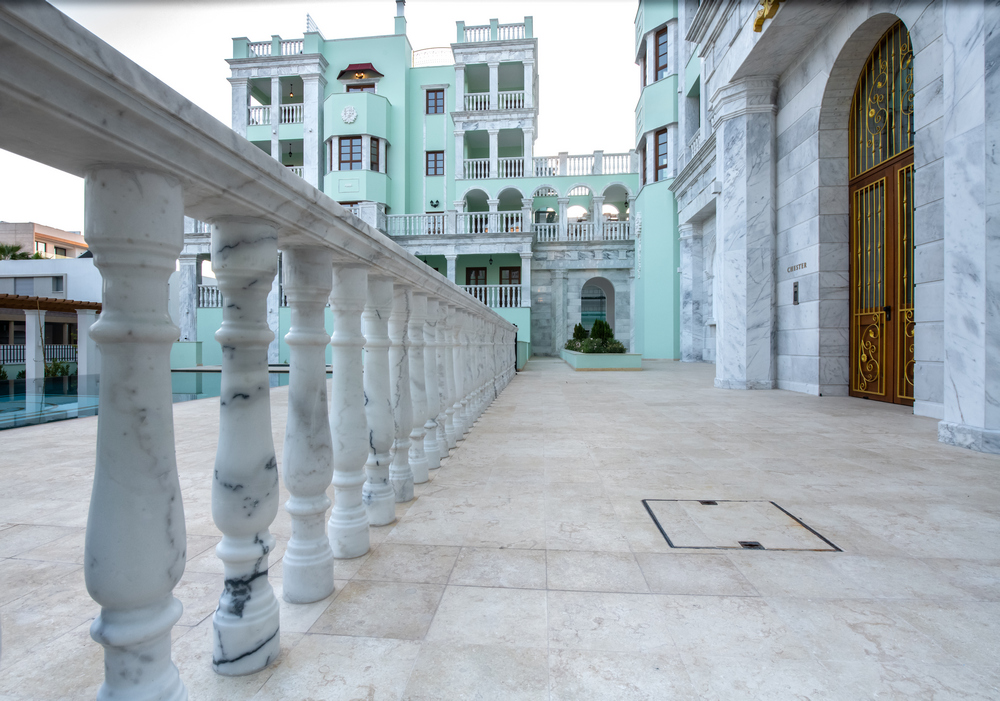
А.: Обычно девелопер старается максимально экономить в процессе строительства, так как всегда возникают непредвиденные расходы. В итоге получается, что на картинке проект выглядит гораздо лучше, чем в реальности. У нас же – наоборот: мы оба по натуре перфекционисты, не можем успокоиться, пока не сделаем так, чтобы нам самим нравилось. Расскажу историю.
В проекте «Белгравия» у нас была заложена керамическая плитка для покрытия пола на верандах, так спецификации к контрактам и подписывались покупателями. Мы уже заканчивали строительство, и внутри квартир были уложены шикарные мозаичные гранитные полы.
А простая плитка на балконе настолько диссонировала со всем остальным интерьером, что мы не смогли смириться с этим визуальным отличием. И при этом уже не скажешь владельцам: «А теперь доплатите за то, чтобы балкон гармонично смотрелся». И мы заменили плитку на мрамор за свой счет, так как к этому моменту все квартиры были уже давно проданы.
Д.: Ну, это была не самая большая статья расходов. На оформление фасада изначально мы забюджетировали один тип мрамора – с желтоватым оттенком. Когда его «вживую» начали прикладывать к стенам, оказалось, что он выглядит просто некрасиво.
Мы срочно начали искать альтернативу. И нашли другой фасадный мрамор – белый с серыми прожилками. Но он стоил намного дороже, чем первоначальный вариант. Тем не менее, мы пошли на этот шаг, несмотря на то что потеряли на этом примерно 10% прибыли от всего проекта.
Зато теперь мы можем гордиться своей работой. И это подтверждают люди, которые, просто проходя мимо «Белгравии» и других проектов, делают видео, восхищаясь их красотой.
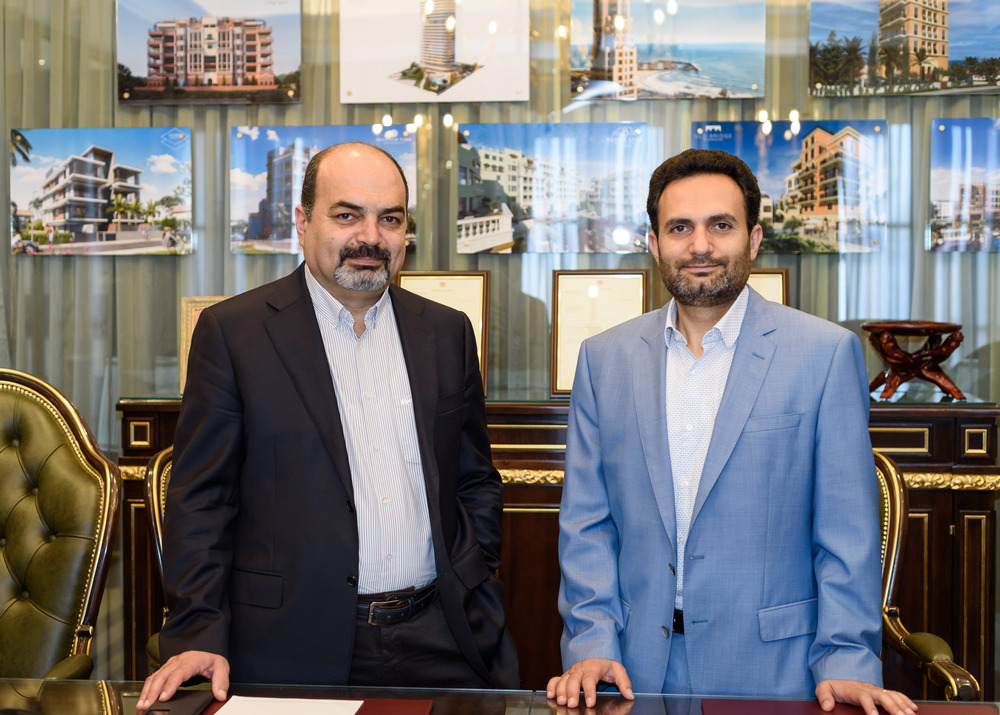
Давид и Александр Петросяны имеют опыт создания международного бизнеса по производству часов с дистрибуцией в 30 странах и офисами в Швейцарии, Гонконге, Москве и на Кипре. Основанная ими CDA Group успешно занимается девелопментом на Кипре. Реализованные ими проекты признаны достопримечательностями острова, на завершающем этапе – высотный комплекс Ararat Grand Residences в Лимассоле, которому суждено стать жемчужиной Кипра.
Александр получил образование в области менеджмента и финансов, имеет степень Executive MBA в области стратегического менеджмента, а также степень магистра в области управления бизнесом.
Давид по первому образованию инженер, имеет степень Executive MBA в области стратегического менеджмента.
На недавней кипрско-индийской рабочей встрече, состоявшейся во время конгресса Best Invest в Лимассоле, участники поговорили о последних событиях в сферах бизнеса и инвестиций и о возможностях развития отношений, обменялись мнениями по различным вопросам сотрудничества между двумя странами.
Открывая мероприятие, верховный комиссар Индии на Кипре Мадхумита Хазарика Бхагат отметила высокий уровень двусторонних связей и широкий спектр перспектив для развития сотрудничества. К собравшимся обратилась и вице-президент Индийского инвестиционного агентства Invest India Варда Танейя, которая записала видеообращение для участников встречи.
Выступая на встрече, руководитель Подминистерства шипинга Марина Хаджиманоли подчеркнула, что в сфере судоходства отношения между Кипром и Индией традиционно тесные, несмотря на то что Индия – самая населенная страна планеты, а на Кипре проживает всего один миллион человек. При этом кипрский регистр судоходства по размеру своего флота занимает 11-е место в мире и 3-е место в Европейском союзе. «Важно, чтобы Кипр и Индия продолжали сотрудничать для достижения наших общих целей как на внутреннем, так и на международном уровне», – сказала министр в заключение своей речи.
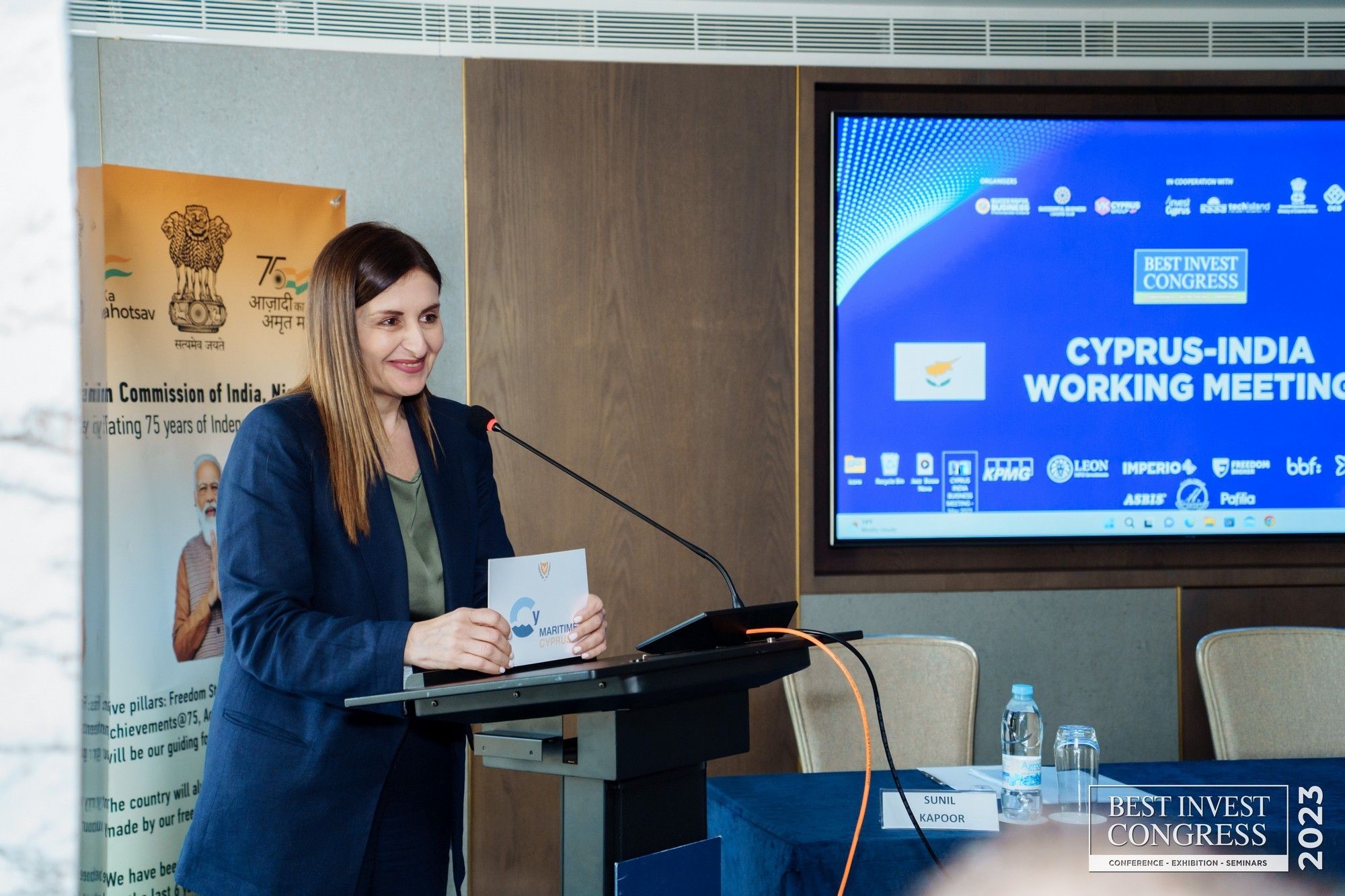
Руководитель Подминистерства шипинга Марина Хаджиманоли
В рамках дискуссии, модератором которой выступил председатель Кипрско-индийской деловой ассоциации Хрисилиос Пеликанос, говорили о самых разных перспективах совместной работы. Сотрудничество возможно среди представителей бизнес-сообщества в сферах туризма, высоких технологий, фондовой индустрии, недвижимости, медицины, инвестиций в инфраструктуру и производство.
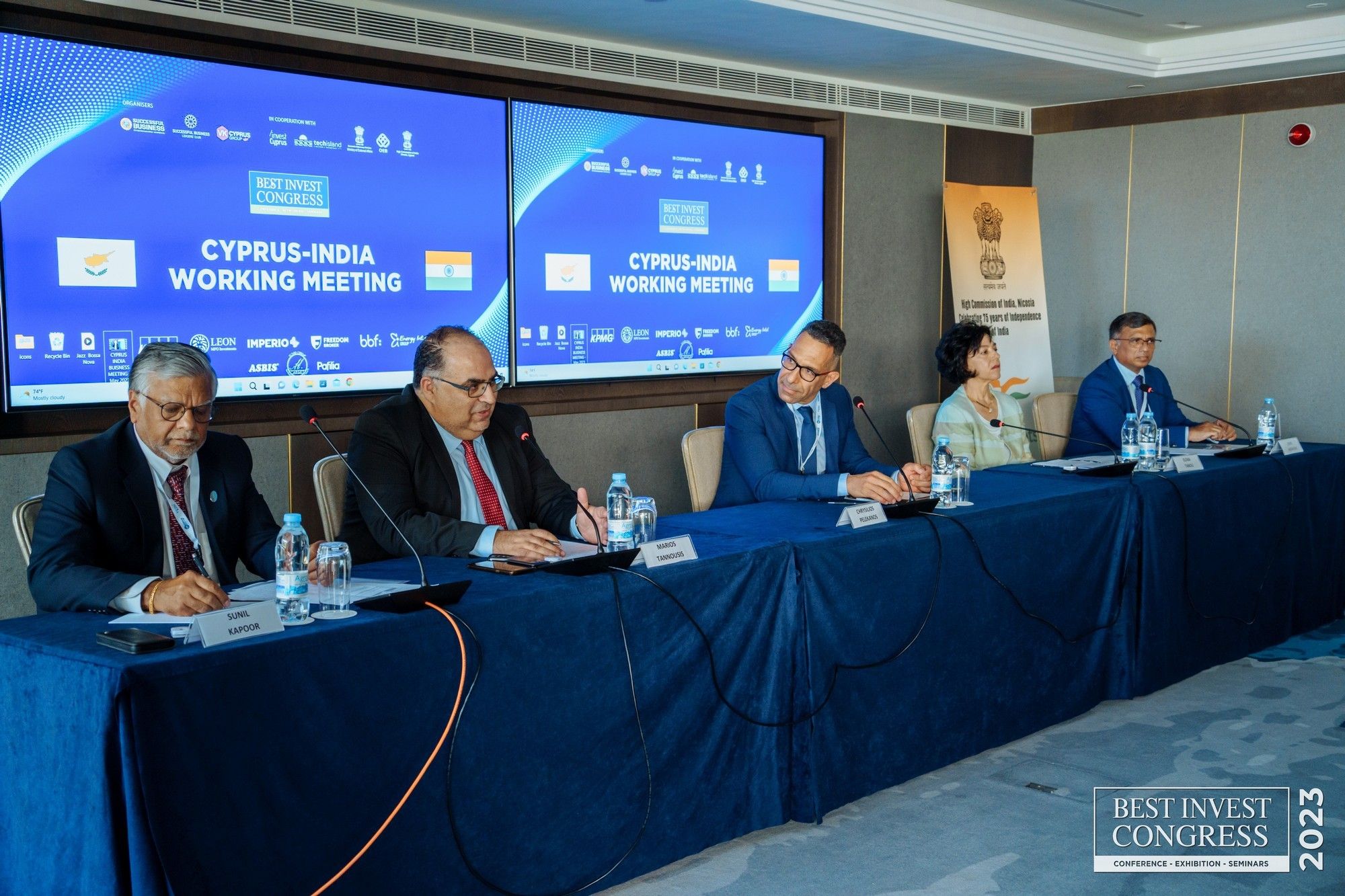
Слева направо: Сунил Капур, директор FML Shipmanagement; Мариос Таннусис, генеральный директор Кипрского агентства по продвижению инвестиций Invest Cyprus; Хрисилиос Пеликанос, председатель Кипрско-индийской деловой ассоциации, партнер PwC Cyprus; Елена Тану, вице-президент Top Kinisis Travel Plc; Джон Абрахам, основатель и генеральный директор Aeon Payment Tech
Читайте также:
О чем говорили на Best Invest?
Как прошел Best Invest Congress 2023
Управляющий Центробанком Константинос Иродоту заявил, что финтех-компании представляют серьезную конкуренцию для банковского сектора, но не могут существовать без него в том, что касается возможности предлагать услуги.
Глава ЦБ выступал на конференции «Как могут сосуществовать банки и финтех?».
Иродоту считает, что сейчас довольно трудно предсказать, к чему приведут инновации. Ссылаясь на последний отчет ЕЦБ о способах оплаты в еврозоне, он отметил, что, хотя наличные были наиболее частым предпочтением, их использование продолжает снижаться: с 79% транзакций в 2016 году до 72% в 2019 году и 59% в 2022 году. Доля онлайн-платежей увеличилась в связи с пандемией, большинство потребителей сейчас используют онлайн-способы оплаты. По мере того, как потребители отказываются от наличных денег, они все больше знакомятся с мобильными приложениями, предлагаемыми банками и финтех-компаниями.
Иродоту также упомянул о проблемах, с которыми банкам придется столкнуться в связи с внедрением инноваций со стороны финтех-компаний. По сравнению с традиционными банками они представляют собой организации меньшего размера и с меньшими расходами. Однако такие организации не могут эффективно функционировать без традиционной банковской системы, иначе их бизнес-модель не будет устойчивой. Дело в том, что банковские счета и депозиты остаются ключевым элементом в финансовой экосистеме и необходимы для сосуществования таких организаций и традиционных банков.
Финансовые учреждения уже признали преимущества финтеха и, по словам управляющего ЦБ, приложили все усилия для сотрудничества. Результатом такого взаимодействия стали инновационные лаборатории и стартапы в секторе финтех. Однако Иродоту подчеркнул, что любые новые возможности сопряжены с вызовами и рисками. Надзорные органы должны убедиться в том, что существующая нормативно-правовая база не оставляет места для рисков. Кроме того, должен существовать международный механизм мониторинга, чтобы надзор работал бесперебойно и, следовательно, обеспечивалась финансовая стабильность за счет минимизации рисков и защиты потребителей.
В своем выступлении председатель Европейского банковского управления Хосе Мануэль Кампа заявил, что приверженность преобразованиям весьма своевременна для Кипра, поскольку после финансового кризиса в государстве произошли значительные преобразования.
Какой кипрский банк самый цифровой?
Каким будет налогообложение финтех-индустрии?
Из этого интервью вы узнаете о жизненном пути необычной женщины, преуспевшей в профессии общественной деятельности. Химик по образованию, директор государственной лаборатории, волонтер благотворительного фонда, активный общественный деятель, а теперь – министр здравоохранения. Во время нашей встречи мы узнали удивительные факты о ее жизни и работе.
– Как начиналась ваша карьера в Министерстве здравоохранения?
– В течение 37 лет я работала в Государственной генеральной лаборатории, которая является независимым подразделением Министерства здравоохранения. Государственная генеральная лаборатория действительно уникальное подразделение, хотя бы потому, что это был первый правительственный департамент, получивший аккредитацию по стандарту ISO. Мы взяли на себя анализ пищевых продуктов, воды, образцов окружающей среды, форензических образцов, полученных от полиции и с мест преступления, фармацевтики, косметики и многого другого. Над этими задачами трудились 180 человек в 21 лаборатории. Кипр – маленькая страна, и важно, чтобы оборудование и опыт были сконцентрированы в одном месте. Это наиболее экономичный и эффективный способ работы.
– Сложно было столько лет проработать в одной организации?
– Да, было нелегко. Я никогда не считала себя госслужащей в том смысле, чтобы работать по часам или какому-то расписанию. Я работала на совесть, на результат, не жалея ни времени, ни сил, пока не выполню очередную задачу. Почти тридцать лет проработала на разных постах, а в последние восемь лет, до того момента, пока не ушла на пенсию в 2017 году, я руководила этой лабораторией.
– Чем еще вы по-настоящему гордитесь?
– Я горжусь тем, что стала инициатором внедрения наркотестов для водителей. У нас в лаборатории была статистика, собранная на основе образцов, полученных от полиции. Мы увидели, что много аварий происходит именно из-за употребления наркотиков водителями. Я подумала, что нам крайне важно начать профилактику подобных аварий, собрала информацию по этой теме в других странах Европы (там уже были введены наркотесты) и взяла на себя ответственность передать наработки в Министерство юстиции и Министерство транспорта.
Путь был непростым – нам понадобилось два года, чтобы убедить Парламент в необходимости принятия таких мер. Действие программы началось в 2018 году. Сразу после запуска стали видны положительные результаты – думаю, что удалось избежать многих аварий.
– Вы также сыграли большую роль в исследовании последствий взрыва боеприпасов в Мари в 2011 году.
– Я тогда была директором лаборатории, и нас попросили собрать и проанализировать образцы морской воды, рыбы, пищи, воздуха из района Мари. Тогда никто не знал, что в контейнерах находилось, из-за чего произошел взрыв и что теперь грозит жителям соседних деревень. Всю эту работу нужно было завершить за полтора месяца. С коллегами из лаборатории мы работали почти круглосуточно. Результаты показали, что химического загрязнения не произошло и люди могут вернуться к своему привычному образу жизни. Но я пошла дальше — обратилась в Министерство обороны с предложением создать лабораторию для анализа всех образцов боеприпасов со всех складов хранения на Кипре. Нужно было проверить условия их хранения и выявить то, что следует уничтожить. В течение полутора лет проект был реализован, а я теперь чувствую себя спокойно, зная, что солдаты, которые служат на территориях, где хранятся боеприпасы, находятся в безопасности.
– Вы были еще председателем антидопинговой команды.
– Все правильно. Мы создали не лабораторию, а команду из 21 человека в рамках Генеральной лаборатории, включая врачей, биохимиков, химиков и биологов. При содействии спортивной организации мы описали все процедуры и правила нашей работы, а образцы на проверку отправляли за границу. Также мы проводили для спортсменов презентации о воздействии допинговых препаратов на здоровье. Очень быстро, буквально в течение пары лет, наша команда антидопингового контроля получила признание и официальный статус от Всемирного антидопингового агентства. И мы даже принимали участие в Олимпийских играх 2004 года в Афинах, в очень сложном проекте, где количество ежедневных проб и ответственность были колоссальными.
– Расскажите о своей работе в Фонде «Караискакио».
– В 1999 году Кипрский реестр доноров обратился ко всем с просьбой зарегистрироваться ради спасения жизней двух маленьких детей – Кемала Сараджаглу и Андреаса Василиу, больных лейкемией. Для них искали совместимых доноров.
Тогда в течение полутора месяцев зарегистрировалось 67 тысяч человек. Я была одной из них. Но уже тогда понимала, что могу сделать гораздо больше. Позже я узнала, что, к сожалению, для Кемала донор не нашелся, а для Андреаса нашли, но не из этих 67 тысяч.
– Шансы настолько малы?
– Да. ДНК киприотов одна из самых сложных, поскольку в истории острова было очень много народов – римляне, османы, венецианцы, израильтяне… Остров всегда хотели завоевать из-за его стратегически важного географического положения. И все эти люди оставили свой след в нашей ДНК. Поэтому поиск подходящего донора для киприотов – невероятно сложная задача. И мы всегда просим как можно больше людей регистрироваться в программе, чтобы повышать шансы детей, для которых это вопрос жизни и смерти.
– Как происходит регистрация? Что нужно сделать?
– Сначала вы регистрируетесь с помощью образца слюны, по которой проводится анализ ДНК. И информация о вас заносится в систему. Регистр фонда стал частью Всемирного регистра добровольных доноров костного мозга, в котором зарегистрировалось около 35 млн человек. Таким образом, когда для пациента ищут подходящего донора для пересадки костного мозга, поиск производится не только по базе Кипра, но и по всему миру. Как только во Всемирном регистре находится подходящий донор, информация сразу поступает в местный регистр, и донор получает сообщение с просьбой прийти и сдать кровь. Кровь обрабатывается определенным образом, собираются стволовые клетки и отправляются пациенту. Мы передавали донорские клетки в Италию, Грецию, Францию, Великобританию, Турцию, Канаду и во многие другие страны – в общей сложности более чем в 33 страны.
– Скольким людям фонд помогает за год?
– Обычно более 250 случаев в год. Кажется, что число не очень большое. Но важно сказать, что Кипрский регистр является первым и крупнейшим в мире на душу населения. В нем зарегистрировано 210 тыс. человек – почти 25% населения острова. На втором месте – регистр Израиля, там числятся около 15% населения страны.
Этот проект по-настоящему трогает мое сердце, потому что я вижу, как много людей по всему миру могут получить нашу поддержку. С 2011 года и до 1 марта 2023 года, когда я вступила в должность министра, я была председателем Фонда «Караискакио». Я горжусь своей работой в фонде и благодарна каждому сотруднику. Мы сделали очень многое в области исследований детских онкологических заболеваний и в других проектах.
– У вас были сомнения, когда вы размышляли о предложении стать министром?
– Да, у меня были сомнения. Все-таки я уже была на пенсии. Но я поняла, что, заняв эту должность, могу принести большую пользу обществу. Я и прежде не работала просто ради карьеры, всегда хотела что-то сделать для страны, для людей. А на этом посту я так много могу успеть воплотить в жизнь!
Несмотря на мой возраст, а даже, может, именно благодаря жизненному опыту, у меня есть воля, выносливость, мудрость, знания и терпение, которые были накоплены на протяжении многих лет. Я уверена, что эти качества могут стать весьма полезными на такой высокой должности.
Я не новичок в министерстве, проработав здесь всю жизнь, я знаю все наши сильные и слабые места. И я методично начала разбираться с тем, что можно предпринять уже сейчас, чтобы наша работа стала более эффективной, а результаты этой работы были бы сразу заметны и меняли жизнь людей к лучшему!
ПЕРВАЯ ЖЕНЩИНА В ROTARY INTERNATIONAL
"Я всегда вела активную волонтерскую деятельность, много времени посвящала общественной работе. Одной из первых организаций была Rotary International, в которую я вступила в 1990 году.
В связи со своей работой в Генеральной лаборатории я часто давала показания в суде по серьезным уголовным делам. Там меня увидел тогдашний генеральный прокурор, который был ротарианцем. Он отметил мою честность и научную скрупулезность в судебных процессах и спросил, хочу ли я присоединиться к Rotary. Я в то время не знала вообще, о чем он говорит, и тогда он пригласил меня на встречи.
Я ответила, что, если это будет связано с общественной деятельностью и волонтерством, я согласна. Для меня всегда были важны эти моменты, поскольку мама меня воспитывала именно на таких моральных ценностях. Я посетила несколько встреч, поняла и что мне интересно, и что пользу могу принести. Так как я была первой женщиной, которая хотела стать ротарианкой, то организаторам пришлось устроить голосование о том, принимать ли женщину в ассоциацию. Я получила 60% голосов. А через год, познакомившись со мной поближе, те, кто проголосовал против, принесли мне свои извинения".
ИСТОРИЯ ФОНДА «КАРАИСКАКИО»
Название фонда «Караискакио» происходит от фамилии жителя Лимассола Михалиса Караискакиса. В 1992 году у его сына Андреаса в возрасте 4 лет была обнаружена лейкемия. В то время на Кипре не было опыта лечения этой болезни, не было и регистра костного мозга, чтобы подобрать донора. Приходилось все время возить малыша за границу, это было очень дорого. Родственники и друзья семьи Караискакис собрали 67 тысяч фунтов, но маленький Андреас не дожил до поездки в США, где уже нашелся подходящий донор. Удрученный горем, Михалис Караискакис не знал, что делать с такой большой суммой денег, ведь он не записывал, кто и сколько дал – плюс друзья не хотели в такой трагический момент даже говорить о возвращении средств. Михалис обратился к министру здравоохранения Манолису Христофидису и попросил потратить эти деньги на создание регистра костного мозга, чтобы никому больше не приходилось в бессилии смотреть на то, как его ребенок умирает из-за невозможности быстро найти донора на Кипре. Так и был создан Фонд «Караискакио» в память о маленьком Андреасе. Михалис Караискакис до сих пор является членом совета фонда, все эти годы он активно участвовал в его работе.
 Попи Канари родилась в Никосии. Училась в Великобритании, по специальности химик. В течение 37 лет Попи Канари работала в Генеральной лаборатории Республики Кипр. С 2009 года возглавляла ее в должности директора.
Попи Канари родилась в Никосии. Училась в Великобритании, по специальности химик. В течение 37 лет Попи Канари работала в Генеральной лаборатории Республики Кипр. С 2009 года возглавляла ее в должности директора.
По ее инициативе при Национальной гвардии появилась сертифицированная лаборатория для контроля качества пороха, что повысило уровень безопасности на военных объектах.
Попи Канари входила в консультативный совет при Европейском агентстве по безопасности продуктов питания, возглавляла Европейскую сеть государственных лабораторий, была председателем европейской секции Американской ассоциации официальных химиков-аналитиков, руководила национальной антидопинговой группой. Специализируется в области безопасности продуктов питания и лекарств, а также в сфере токсикологии.
С 1999 года вошла в совет директоров фонда «Караискакио», с 2011 года – его председатель. В 2005 году координировала создание первого банка стволовых клеток пуповинной крови. Входит в советы директоров Кипрского института исследований рака и Института Кипра.
В эксклюзивном интервью «Успешному бизнесу» министр энергетики, торговли и промышленности Республики Кипр Йоргос Папанастасиу делится своими главными целями в должности министра и мечтой, которую он хочет воплотить в жизнь. Он говорит о создании условий для добычи газа и производства электроэнергии в стране, а также о планах по сжижению газа и экспорту. Он рассказывает о модульных технологиях, которые могут значительно упростить строительство завода по производству сжиженного газа и обеспечить гибкость его эксплуатации. В этом интервью – подробности о стратегии, которая уже в течение ближайших лет может привести Кипр к новым энергетическим реалиям.
– Исходя из вашего предыдущего опыта, какими вы видите перспективы Кипра в нефтегазовой индустрии?
– Я считаю, что у нас есть потенциал стать довольно успешным производителем и экспортером газа. Есть несколько газовых месторождений, которые позволят это сделать. Однако существует и политическая проблема, связанная с разделением Кипра. Она вызывает определенные сложности с разработкой этих месторождений. Кроме того, появляется вопрос распределения доходов от реализации газа между двумя частями страны.
В то же время, я думаю, что именно энергетика может стать инструментом для решения кипрской проблемы. Мне кажется, что два сообщества могут стать одним, если представят, какие перспективы открываются при этом объединении и совместном использовании морских богатств. Наша нация может процветать и жить счастливо в изобилии.
– Существует мнение, что извлекать запасы газа, превращать его в жидкость и экспортировать очень дорого и небезопасно для экологии. Кипр – маленькая страна без промышленного производства. Действительно ли нам будет выгодно стать страной – экспортером газа?
– Есть две точки зрения на эту проблему. Моя позиция такова, что, даже имея развитую промышленность, можно сохранять экологическую безопасность региона, иметь чистый воздух и море, развивать туризм. Конечно, размер острова не позволяет разнести на большие расстояния промышленные предприятия и отели. Но при правильном управлении рисками и хорошем менеджменте никакой угрозы для жизни и благополучия в близлежащих населенных пунктах или туристических комплексах не будет.
– Как будет развиваться энергетическая отрасль Кипра в ближайшие годы?
– Что касается производства электроэнергии, я считаю, что текущая ситуация с размещением генераторов электроэнергии организована правильно. У нас есть генерация на главной государственной электростанции страны, в ближайшее время в том же районе появится еще и частный генератор традиционной энергии. Есть также станция Декелия, находящаяся к востоку от Ларнаки. Размещение традиционной генерации электроэнергии в двух разных местах обеспечивает баланс сети.
Но проблема Кипра в том, что основой всей системы является традиционная генерация электроэнергии. Только недавно стала развиваться солнечная энергетика. Индивидуальные домохозяйства начали инвестировать в солнечные панели и размещать их на крышах своих домов. Это способствует более стабильной работе сети, поскольку генерация теперь происходит в разных ее частях.
Мы уже добились определенных результатов. Например, решили вопрос, который многие годы был на этапе рассмотрения. Я имею в виду виртуальный сетевой тариф. Вы можете установить фотоэлектрические панели в одном месте, а производство электроэнергии учитывать в другом месте. К примеру, у вас есть квартира в городе и участок земли в деревне. В квартире для установки панелей места нет. Вы можете поставить их на своем земельном участке и использовать эту электроэнергию для покрытия потребления в вашей квартире. Подобный тариф есть и для отелей, и для предприятий.
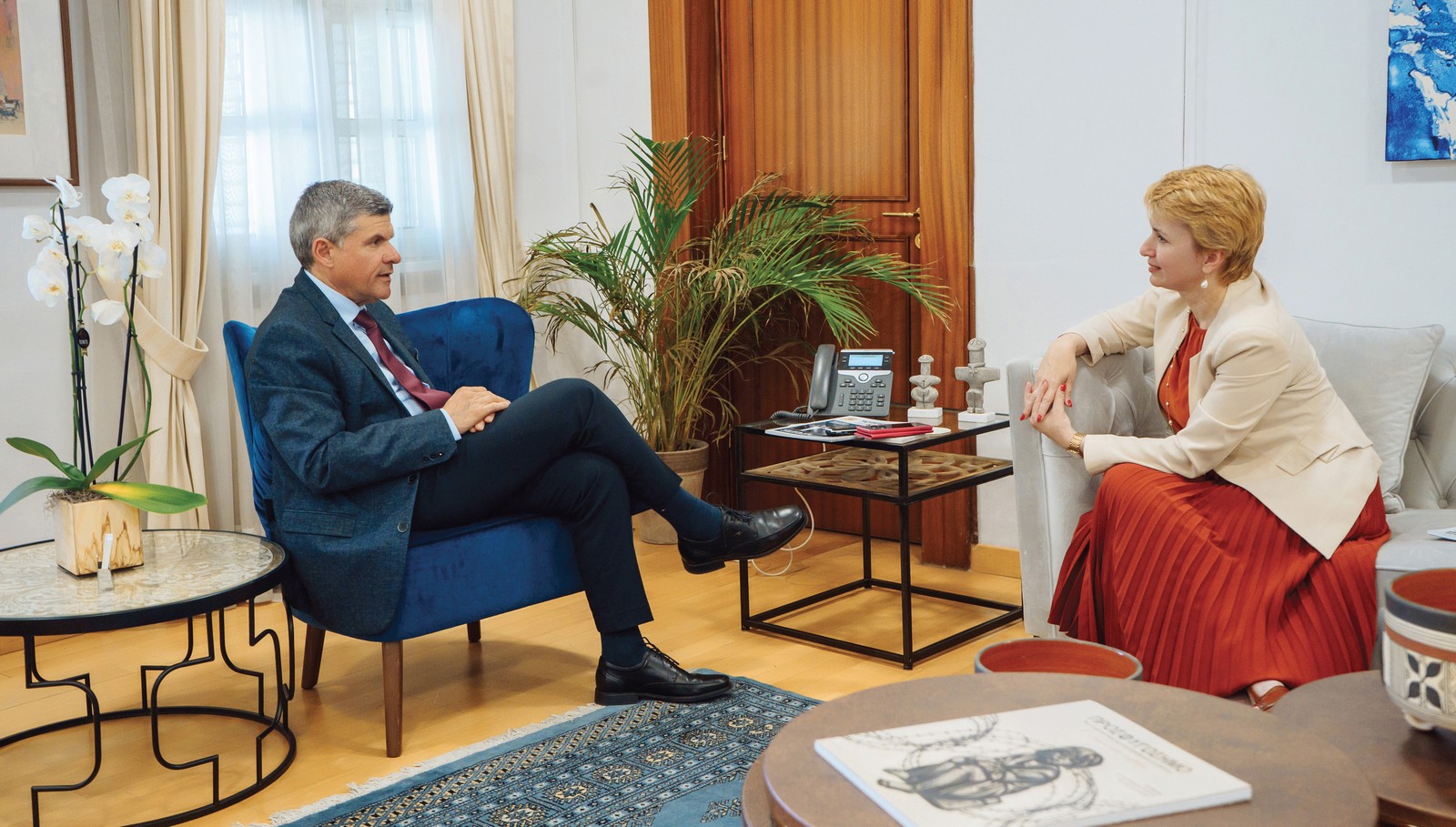
– Но «зеленая энергетика» непредсказуема – солнце то есть, то нет, а ветер не запрограммируешь по часам. Как решить эту проблему?
– Вы правы. Ветрогенераторы производят энергию, когда дует ветер, а солнечные панели — в светлое время суток. Поэтому мы должны где-то сохранять энергию, полученную в течение дня, чтобы использовать ее вечером. Значит, нужны какие-то батареи, аккумулирующие выработанную энергию. Над этим мы думаем, есть несколько вариантов решения задачи.
– Какие главные цели вы ставите для себя в должности министра? Есть ли у вас мечта, которую хотелось бы воплотить в жизнь?
– Если бы у меня не было мечты, я бы вряд ли согласился перейти с высокооплачиваемой позиции в мультинациональной компании на государственную должность. Я хочу создать условия для добычи газа из наших месторождений, чтобы использовать его для производства электроэнергии в стране. Кроме того, часть добытого газа можно направлять на сжижение и обеспечить рабочими местами местное население, а также получать доход от экспорта сжиженного газа. Я понимаю, что воплотить в жизнь эту мечту за пять лет сложно. Но абсолютно реально уже за полтора года создать производство электроэнергии с минимальными затратами.
– Готовы ли наши электростанции к потреблению этого типа топлива?
– Да, станция в районе Василикос в настоящее время находится в процессе конверсии и будет готова к концу года для перехода на природный газ. Таким образом, станция станет двухтопливной, что позволит повысить ее защищенность от перебоев с поставками топливных материалов.
Мы планируем организовать форум, на который пригласим все нефтегазовые компании Восточного Средиземноморья, чтобы обсудить движение к новому видению – к тому, чтобы Кипр стал одним из центров для сжижения природного газа.
Газ будет транспортироваться по трубопроводам из близлежащих месторождений, затем подаваться в установку по сжижению, где превратится в сжиженный природный газ. После этого он будет погружаться на суда для доставки в европейские страны.
– Уже много раз обсуждался вопрос строительства завода по производству сжиженного газа, и решение не было принято. Назывались разные причины.
– Вопрос не мог решиться, поскольку у нас не было так называемых модульных технологий, из которых «складывается» небольшой завод. Раньше для строительства требовались большие инвестиции: один-два миллиарда евро. Для модульных технологий такой бюджет не нужен. Кроме того, эти технологии позволяют в сжатые сроки перенести завод с одного места в другое, например, когда на месторождении заканчивается газ. Эти конструкции устанавливаются на берегу в непосредственной близости от места добычи газа и могут работать на возобновляемой энергии.
– Насколько завод из модульных технологий дешевле альтернативных вариантов?
– В два раза. Альтернативным решением с точки зрения быстрого перемещения являются суда FLNG (floating liquefied natural gas platform), на которых находится завод по сжижению газа. Но такие решения нам не подходят не только с точки зрения объема инвестиций, но и с точки зрения экологических рисков.
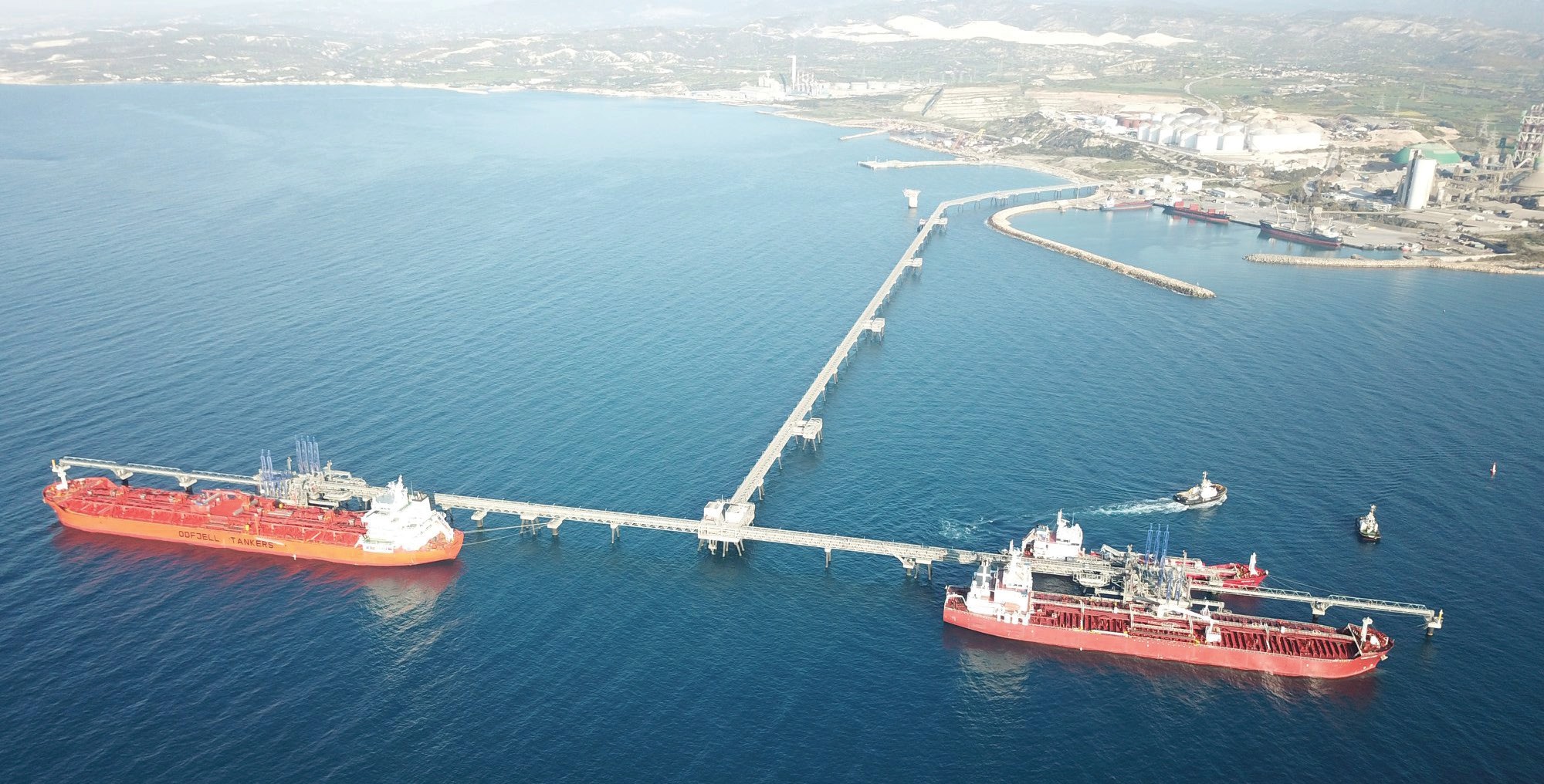
Еще одно важное изменение, которое вызывает большой интерес у населения, – это разработка платформы e-kalathi. Суть проекта в том, что с помощью своего смартфона вы можете создать «корзину», куда будете «складывать» товары, которые хотите приобрести в супермаркете. Вы можете внести несколько десятков позиций. Смартфон, зная ваше местоположение, предложит вам ближайшие места, где эти товары можно купить дешевле.
– Но для этого нужна актуальная информация из всех супермаркетов…
– Да. Мы внесем в закон требование, по которому супермаркеты будут обязаны ежедневно обновлять информацию о ценах на нашей платформе. Сначала планируется размещение 400 товарных позиций, и постепенно мы будем расширяться до 1500 наименований.
– А если человек захочет узнать лучшую цену на конкретный товар?
– На платформе будет возможность сканировать штрих-код конкретного продукта, и система предложит ближайшие места, где его можно приобрести по более низкой цене.
– Звучит как технологическая революция.
– Да, это очень интересный проект. Основная платформа была разработана в Греции. А мы работаем над ее адаптацией и развитием для Кипра.
– Сколько времени займет ее внедрение?
– Осенью планируем выложить приложение на Apple Store и Google Play.
– Как вы пришли к выбору профессии?
– С раннего детства меня увлекало все техническое, инженерное. В гимназии изучал естественные науки, позже закончил Высший технологический институт Кипра (ныне – часть ТЕПАК в Лимассоле) и City University в Лондоне. Там я занимался механической инженерией, проводил исследования по ветряным турбинам и генерации энергии от ветра. Магистерскую программу проходил в Королевском колледже Лондонского университета по направлению «Холодильная техника и кондиционирование воздуха».
– Удалось ли применить знания на практике?
– Конечно. Правда, последняя специальность не относится к моей основной профессии, но благодаря той программе меня заметили и пригласили на работу в крупную нефтегазовую компанию BP, где я отработал 27 лет. После было 12 лет работы в нидерландской компании VTTI, которая построила терминал в районе Василикос. Они пригласили меня на работу, поскольку искали человека, понимающего местную среду, культуру, менталитет и умеющего руководить процессами, необходимыми для развития большого инвестиционного проекта.
В общей сложности в нефтегазовой промышленности я проработал 39 лет.
Йоргос Папанастасиу родился в Никосии. По образованию – инженер-механик. Закончил Высший технологический институт Кипра (ныне – часть ТЕПАК) и Лондонский университет по этой специальности. В магистратуре Королевского колледжа в Лондоне специализировался на работе рефрижераторов и кондиционеров.
На протяжении 27 лет работал в компании British Petroleum (ВР) в Великобритании, европейских странах и на Кипре. На острове возглавлял местное представительство ВР. Имеет опыт в сфере промышленной энергетики, поставок и снабжения, безопасности труда, продаж, корпоративного управления и т.д.
В 2011 году назначен генеральным директором и управляющим советником компании VTT Vasiliko Ltd – дочерней компании, созданной концерном VTTI B.V. Под его началом в Василико шло строительство терминала для хранения и управления энергетическими продуктами.
Председатель Кипрской организации стандартизации и Кипрского управления по сертифицированию. Возглавляет Кипрско-голландскую бизнес-ассоциацию в рамках Торгово-промышленной палаты Кипра, член совета директоров Федерации работодателей и промышленников.
 Йоргос Папанастасиу:
Йоргос Папанастасиу:
Я очень люблю велоспорт. Когда-то вместе с другими любителями велоспорта я создал Никосийский велосипедный клуб, в котором сегодня уже около 500 участников.
С 1999 года и до недавнего времени я каждые выходные отправлялся куда-нибудь на велосипеде. Раньше я проезжал 10 000 километров в год. Многие даже на автомобиле не наезжают такой километраж.
Но сейчас, со времени вступления в должность, к сожалению, у меня есть возможность проезжать не более 200 км в месяц. Я регулярно езжу в горы, в другие города – например, из Никосии в Протарас и обратно.
Слова Достоевского о красоте, которая спасет мир, не потеряли своей актуальности за 150 лет, прошедших с тех пор, как они были написаны. В контексте искусства масштаб этого мира можно понимать очень по-разному. Об этом мы поговорили с художницей, владелицей московского арт-пространства «Gartallery» Ксенией Грищенко.
– Как вы начали свой творческий путь в искусстве? Что вас вдохновило стать художником?
– В детстве я всегда рисовала. Но заняться этим профессионально в юности не удалось. Уже будучи взрослой, я поступила в Академическую школу дизайна в Москве. Одним из самых любимых предметов для меня стало художественное искусство. Этот предмет так меня увлек, что я начала брать частные уроки у профессиональных художников. Благодаря моим преподавателям я научилась работать в разных стилях, применять различные техники.
– Какие темы или идеи наиболее часто присутствуют в ваших работах? Что вы хотите сказать своими произведениями?
– Мои темы и идеи разнообразны. Каждая выставка – это всегда отдельный проект или путешествие со своей концепцией, которые захватывают меня полностью.
Например, к выставке «Детство» я написала не только портреты детей, но и полюбившиеся детские игрушки моего и следующего поколений. Вся моя семья помогала мне в составлении каталога к выставке, сочиняя стихотворения к каждой работе.
А выставка «МояКубаМоя» стала результатом нашего с мужем посещения этой необычной страны. Я напиталась ее колоритом и после возвращения в течение года создавала работы по кубинским мотивам — яркие и захватывающие образы не покидали меня. Я постаралась изобразить все, что так сильно меня поразило: обычных кубинцев, ретроавтомобили и городскую архитектуру.
Я всегда пишу работы в хорошем настроении, поэтому они несут позитивный заряд. И я счастлива, когда зрители разделяют со мной положительные эмоции и любовь к жизни во всех ее проявлениях.
– Как часто вы бываете на Кипре? Планируются ли выставки на острове?
– Последние несколько лет мы с семьей проводим все лето на Кипре. В 2021 году я впервые привезла свои работы из серии «Соцреализм» для выставки «SoNoRe – Soviet Nostalgie Recollection». И была приятно удивлена ее успехом и теплым приемом киприотов и гостей острова. Многие зрители интересовались моими планами на будущее и в особенности проявляли интерес к каталогам прошедших выставок, посвященных цветам. Поэтому летом 2023 года я привезла на остров свои цветочные натюрморты для новой выставки – «Flovers». Игра букв в названии выставки неслучайна. Этим я хотела подчеркнуть не только цветы, но и любовь, с которой они дарятся.
– Каковы ваши ближайшие цели? Есть ли у вас какие-то особые проекты или мечты, которые вы хотели бы реализовать?
– Сейчас я прорабатываю два концептуальных проекта. Первый называется «Окна» и посвящен восприятию человеком мира через окно. Сюжетом картин могут стать как внешние впечатления, так и внутренние переживания.
Второй проект – это серия работ в новой для меня технике коллажа, где вместо красок используются страницы старых журналов и газет.
Мои друзья и почитатели всегда ждут открытия каждой моей новой выставки. Я счастлива, что мои работы нашли свой дом не только в России и на Кипре, но и в других странах мира.
– Какие советы вы можете дать начинающим художникам, которые хотят пойти по вашим стопам?
– Никогда не поздно начинать заниматься своим любимым делом. И важно верить в свою мечту и идти к ней.
– Расскажите нам о самых важных событиях или достижениях в вашей карьере.
– Благодаря поддержке моей семьи в 2019 году я открыла частную галерею «Gartallery» в самом центре Москвы. Это не только моя домашняя площадка, но и место проведения выставок как известных, так и начинающих художников. Я рада, что всего за несколько лет галерея обрела известность и объединила широкий круг друзей.




В статье использованы материалы из личного архиа Ксениии Грищенко.
Прошедший в конце мая 2023 года VII международный конгресс Best Invest в Лимассоле собрал экспертов, инвесторов, аналитиков, предпринимателей из разных стран. В фокусе внимания были современные технологии, все активнее внедряющиеся в бизнес и частную жизнь. В ходе панельных дискуссий обсудили рост экономики Кипра, инновации, вызовы цифрового мира и взаимодействие бизнеса с наукой и правительством.
В работе панельной дискуссии «Инвестиции, релокация и переезд штаб-квартир на Кипр: улучшаем деловую и нормативно-правовую среду», которая открыла первую пленарную сессию под названием «Экономический обзор и перспективы Кипра», приняли участие: Петр Валов, соучредитель, член правления ассоциации TechIsland, основатель, генеральный директор Exness; Янгос Хаджияннис, член правления Invest Cyprus (кипрское агентство по продвижению инвестиций), генеральный директор кипрской бизнес-школы CIM; Кирьякос Коккинос, основатель Business Insights Consulting, бывший руководитель подминистерства исследований, инноваций и цифровой политики; Мариос Александру, соучредитель, главный операционный директор EnergyIntel Services.
Модератором панельной дискуссии выступил Филипп Аммерман, управляющий партнер Navigator Consulting Group.
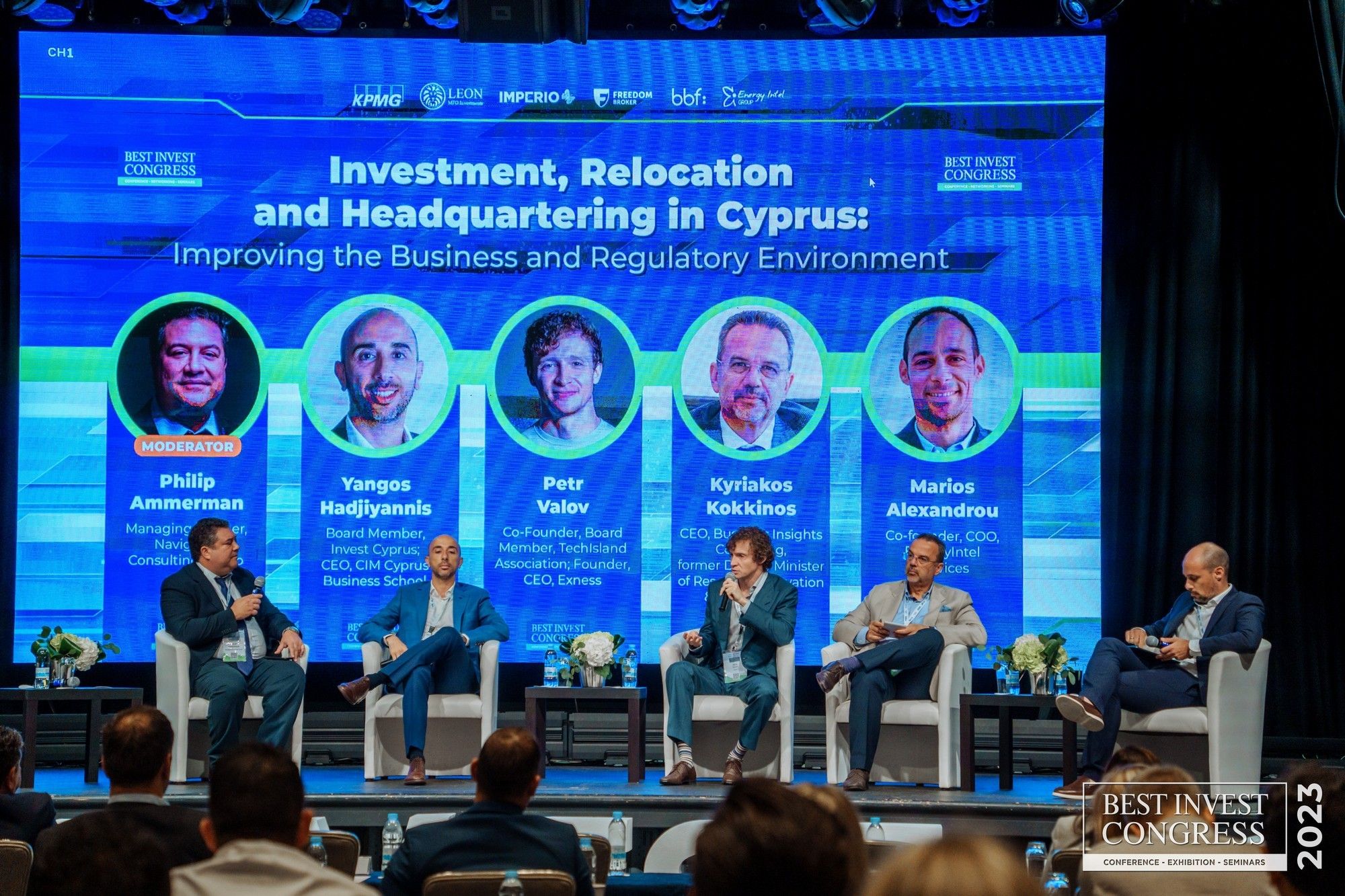
Во вступительной презентации Филипп Аммерман представил анализ показателей основных отраслей экономики Кипра, которая в целом демонстрирует рост традиционных, важнейших секторов, таких как, например, туризм, постепенно возвращаясь к значениям допандемийного периода. Все участники дискуссии сошлись во мнении, что экономика Кипра диверсифицируется, развиваются отрасли, связанные с информационными технологиями и финтехом, и ведущую роль в этом играют компании, избравшие Кипр местом размещения штаб-квартир, релоцирующие своих сотрудников и стимулирующие тем самым рост экономики острова в различных сферах.
Государство должно не только привлекать на Кипр все новые компании, создавая для них благоприятные условия, но и удерживать эти бизнесы, улучшая деловую и нормативно-правовую среду на Кипре, цифровизируя бизнес-инфраструктуру и гармонизируя социальное и общественное пространство для дальнейшего роста экономики и развития республики.
В работе панельной дискуссии «Технологии и инновации: одна из быстрорастущих опор экономики Кипра», которая открыла вторую пленарную сессию, посвященную вопросам инвестиций в технологии и научно-технические разработки, приняли участие: Алексей Губарев, соучредитель, член правления ассоциации TechIsland, учредитель и член правления Palta, основатель XBT Holding; Христос Онуфриу, генеральный директор Odyssey Cybersecurity; Хико Райчик, основатель Yomora 4 Media; Стилианос Ламбру, соучредитель Heart Group и Reflect Fest; Николас Мастрояннопулос, бывший руководитель государственного департамента по исследованиям и инновациям.
Модератором панельной дискуссии выступил Христос Вассилиу, генеральный директор KPMG Cyprus.
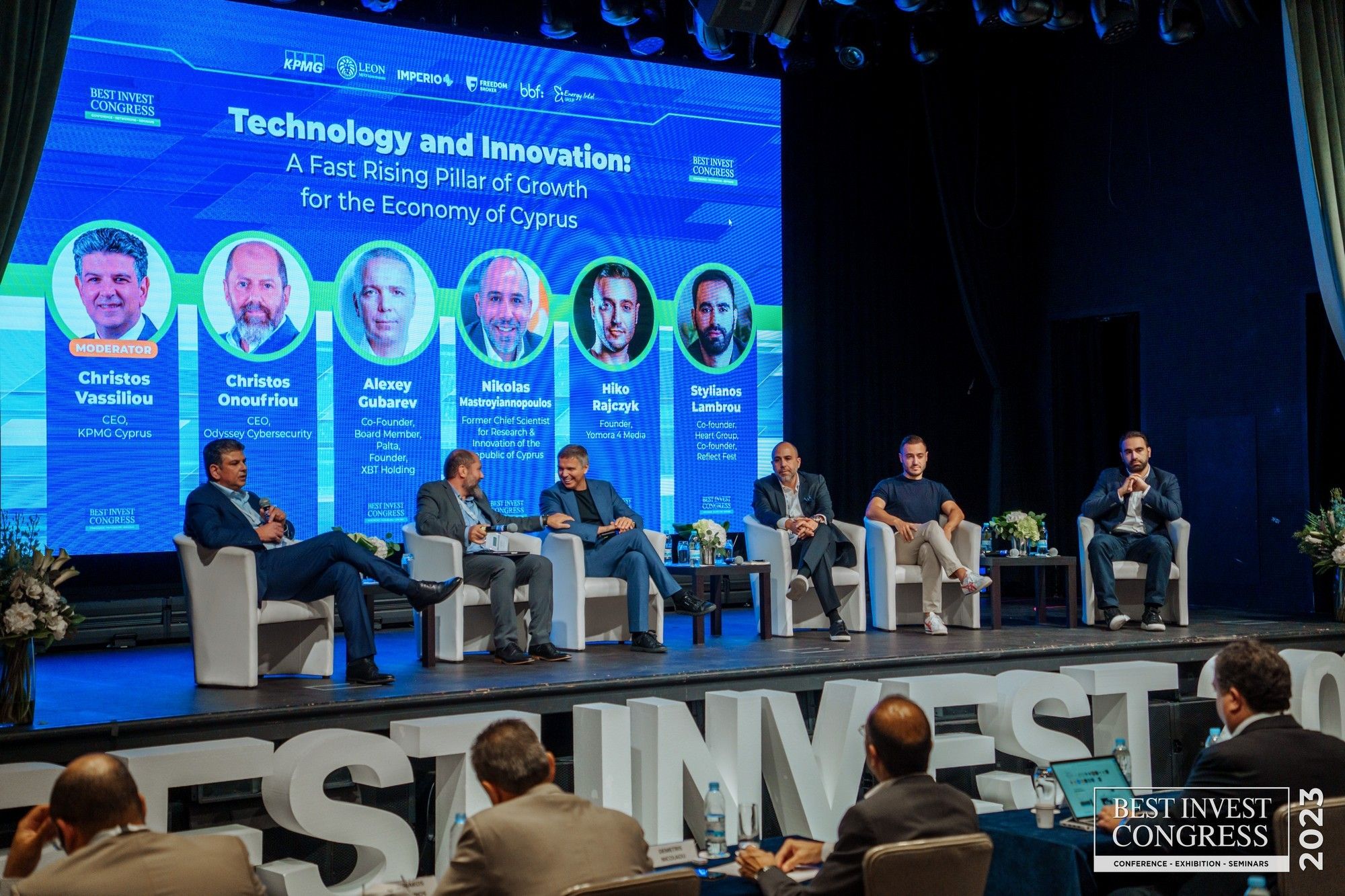
Участники дискуссии отметили возрастающее значение Кипра как регионального высокотехнологичного центра – в настоящий момент технологический сектор Кипра обеспечивает 12,5% ВВП страны и демонстрирует положительную динамику год от года. Это открывает широкое окно возможностей, но вместе с тем требует исправления недостатков инфраструктуры и устранения факторов, которые препятствуют превращению Кипра из регионального в глобальный технологический хаб.
Примеры успеха ведущих IT-компаний, развивающих бизнес на Кипре, вдохновляют новые технологичные стартапы, которые приезжают на остров и вносят свой вклад в дальнейшее развитие экономики Кипра – и как следствие, высокотехнологичные продукты и услуги становятся важнейшим направлением экспорта Кипра. Но чтобы не оказалось так, что однажды все IT-компании со всеми сотрудниками покинут Кипр, забрав с собой интеллектуальную собственность и оставив после себя лишь пустые дома, нужна долгосрочная стратегия дальнейшей имплементации высокотехнологичных компаний в экономику Кипра, которая будет учитывать интересы всех заинтересованных сторон.
В работе панельной дискуссии «Раскрывая потенциал игровой индустрии: возможности и стратегии для инвестиций в сфере разработки игр», которая прошла в рамках второй пленарной сессии, посвященной вопросам инвестиций в развитие технологий и научно-технические разработки, приняли участие: Марат Карпеко, главный операционный директор Wargaming.net, сооснователь Indata Labs; Сергей Орловский, эксперт геймдев-индустрии, основатель Nival, Astrum Nival, Helio Games, Luden.io, Uviz.io; Кирилл Гурский, руководитель отдела игр и развлечений GEM Capital; Александра Рудис, генеральный директор и соучредитель Apella Games.
Модератором панельной дискуссии выступил Роман Гурский, руководитель отдела игр и развлечений GEM Capital.

Участники дискуссии обсудили текущее состояние мировой игровой индустрии, отметив, что 2022 год стал первым за практически десять лет, когда отрасль не продемонстрировала рост, а упала на 5%. Тем не менее инвестиции в сфере разработки игр остаются привлекательным сценарием для инвесторов, так как в целом мировой рынок игр является одним из самых быстро растущих за последние годы. И если вначале на успех влияли косвенные факторы, такие как пандемия, то теперь он больше зависит от качества самого релиза: мультиплатформенности, кибербезопасности, — и маркетинга в целом. Вместе с тем, экономический и политический кризисы повышают издержки компаний, удорожают бизнес-процессы, снижают рентабельность и прибыльность и оказываются сдерживающими факторами для инвесторов.
В работе панельной дискуссии «Горизонты планирования инвестиций на Кипре: полное руководство по фондам, фондовым рынкам и финансовым инструментам», которая открыла третью пленарную сессию, посвященную вопросам инвестиционных фондов, технологиям искусственного интеллекта в инвестициях, будущего интернет-платежей и кибербезопасности, приняли участие: Андрей Наруцкий, генеральный директор Leon MFO Investments; Мария Панкова, руководитель бизнес-направления финансового инжиниринга и структурирования Freedom Finance Europe; Димитрис Такситарис, главный исполнительный директор MAP S. Platis; Ставриана Коферос, вице-президент совета директоров Research Innovation Foundation, посол EIC.
Модератором панельной дискуссии выступила Сара Гуннервик, управляющий партнер Kendris Cyprus.
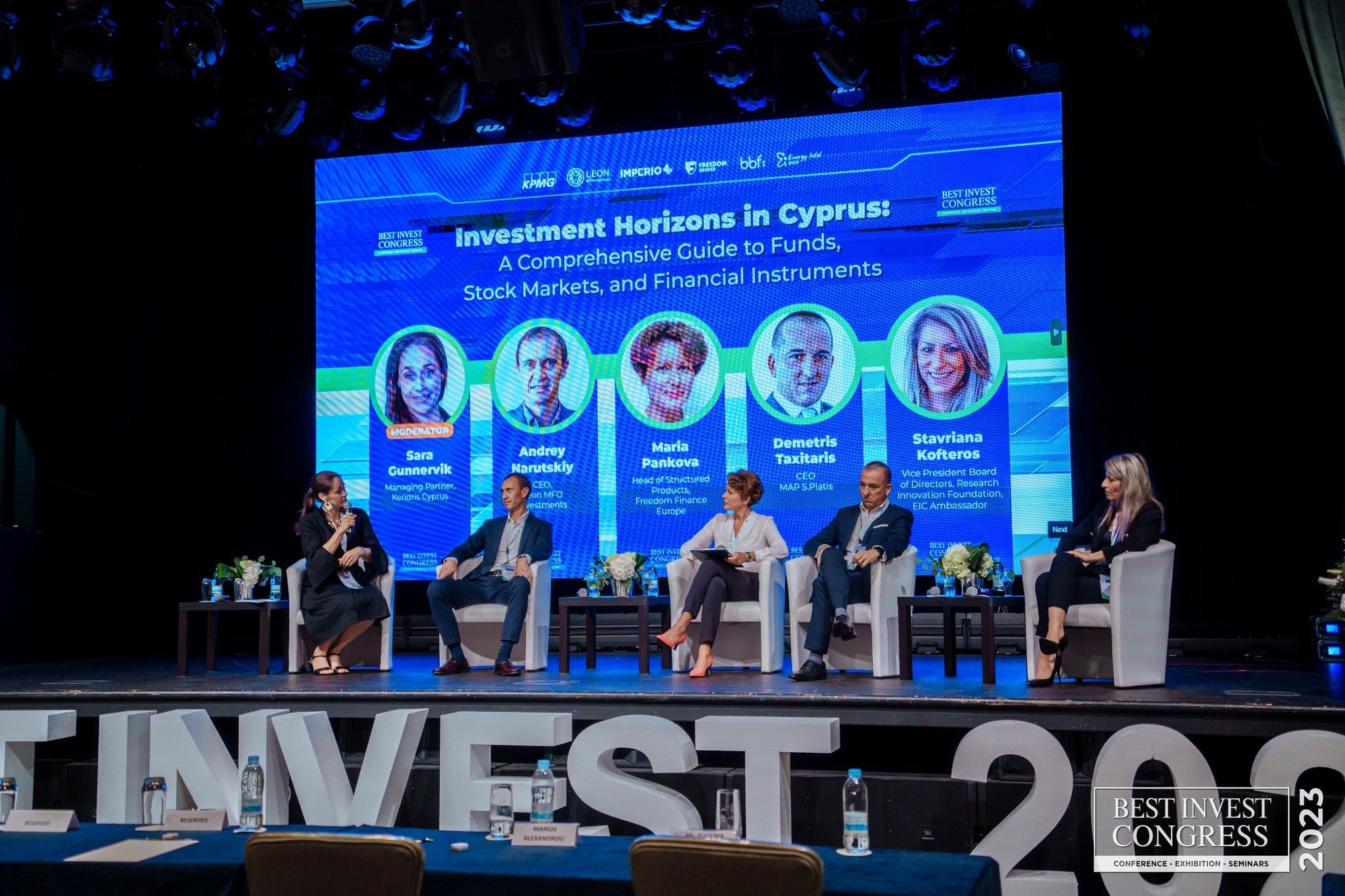
Обсудили следующие шаги для развития Кипра как привлекательной инвестиционной и фондовой юрисдикции. Анализ текущего состояния кипрского инвестиционного климата, включающего фонды, фондовые рынки и акции, показывает, что данный сектор продолжает развиваться, несмотря на различные сдерживающие факторы: слабо развитую инфраструктуру и регуляторную политику, сложности с администрированием фондов и недостаточно оперативными бизнес-процессами. Налоговая реформа могла бы сделать Кипр одной из наиболее привлекательных и конкурентоспособных юрисдикций для развития инвестиционных фондов. Также участники дискуссии выступили с предложением о создании единой платформы или ассоциации на Кипре, которая объединила бы институциональных инвесторов (частные банки, пенсионные фонды, страховые организации) с одной стороны и местных управляющих фондами с другой, что позволило бы преумножать капитал внутри страны, а не выводить его в другие юрисдикции.
В работе следующей панельной дискуссии – «Влияние технологий искусственного интеллекта (ИИ) на трансформацию различных отраслей: глубокое погружение в наиболее многообещающие возможности для инвестиций в ИИ», посвященной вопросам инвестиционных фондов, технологиям искусственного интеллекта в инвестициях, будущего интернет-платежей и кибербезопасности, приняли участие: Антонис Скуллос, региональный руководитель Oracle; Костас Петсас, заместитель директора / партнер Kyndryl; Антония Майкл, руководитель IBM Cyprus; Джордж Малеккос, генеральный директор Powersoft.
Модератором панельной дискуссии выступил Димитрис Ниссиотис, генеральный директор NetU Consultants, президент ассоциации CITEA.

По мнению экспертов, технологии ИИ сделали огромный рывок в своем развитии за последние несколько лет, проделав путь от теоретической концепции и абстрактной чудо-технологии до эффективного и необходимого инструмента для различных сфер бизнеса. Стратегия цифровизации Европейского Союза предполагает, что минимум 75% компаний ЕС будут использовать технологии ИИ к 2030 году. Сегодня ИИ успешно внедряется практически во всех отраслях, включая здравоохранение, финансы и транспорт. Такие технологии ближайшего будущего, как компьютерное зрение или беспилотный транспорт, не только кардинально изменят привычное социальное поведение людей, но и заставят задуматься о кибербезопасности, защите данных и регулировании всех аспектов использования технологий ИИ.
В работе панельной дискуссии «Платежная революция: новые тренды в платежах, кибербезопасности, банковских инновациях и будущем денег в цифровом мире», которая прошла в рамках третьей пленарной сессии, посвященной вопросам инвестиционных фондов, технологиям искусственного интеллекта в инвестициях, будущего интернет-платежей и кибербезопасности, приняли участие: Джон Йоргулас, председатель Ассоциации электронных денег и платежных учреждений (ACEMPI); Александр Апостолидис, научный сотрудник CCAF и Европейского университета Кипра; Ульрик К. Ликке, инвестор в технологии и цифровые активы, директор Marlin & Spike; Христодулос Пападопулос, основатель и генеральный директор CPbros Group, geevo®; Джон Абрахам, основатель и генеральный директор Aeon Payment Technologies.
Модератором панельной дискуссии выступил Димитрис Николау, руководитель отдела развития бизнеса, Leon MFO Investments.
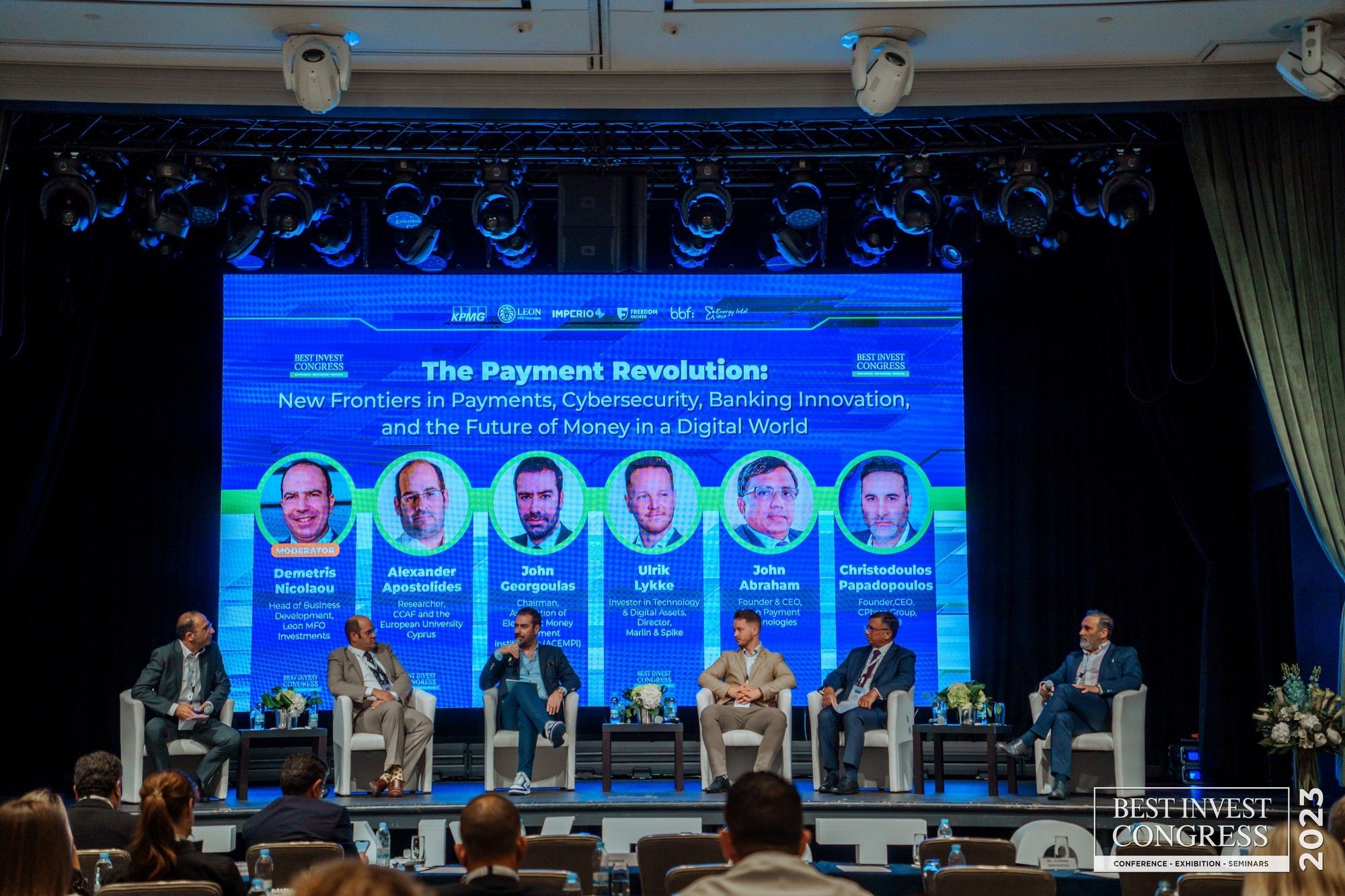
Участники дискуссии обсудили текущее состояние глобального платежного ландшафта, отметив основные тренды: бесконтактные платежи через смартфоны с использованием NFC-модуля, развитие приложений для осуществления P2P-транзакций, успех криптовалют, онлайн-платежи и мгновенные платежи через Интернет. Увеличивающийся спрос на обслуживание в цифровых каналах, быстро растущий рынок так называемых «необанков» – ключевые стимулы для многих банков внедрять технологические инновации и развивать свои продукты.
Читайте также:
Как прошел Best Invest Congress 2023